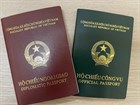On July 1, 2017, the 2015 Vietnam Maritime Code and the 2016 Law on Property Auction will officially take effect. To facilitate the public's understanding of the new legal policies, Secretary of Law has compiled some new points in these two documents as follows:
The Vietnam Maritime Code 2015 was passed by the XIII National Assembly at the end of 2015 but will officially take effect on July 1, 2017. The Code consists of 20 chapters and 341 articles regulating issues related to the maritime field such as maritime activities, state management of maritime affairs, and other activities related to the use of seagoing vessels.
Vietnamese Vessels Must Fly the Vietnamese National Flag
The Maritime Code clearly stipulates two types of subjects that must fly the Vietnamese national flag, including:
- Vietnamese seagoing vessels- Other boats when operating at Vietnamese seaports
In addition, foreign military vessels, when entering Vietnamese territorial waters to access a seaport (submarines and other submerged vehicles), must operate in a surfaced state and must fly the Vietnamese national flag at a position equal to the national flag of the vessel’s flag state.
Seagoing Vessels Must Have Names and Names Must Not Be Duplicate
Vietnamese seagoing vessels must be named and adhere to the following principles:
- The vessel's name is given by the shipowner but must not duplicate names already registered in the Vietnam National Register of Ships;- Names of state agencies, armed forces units, political organizations, socio-political organizations may not be used as the entire or part of the vessel’s name, unless with the consent of the respective agency, unit, or organization;- Words or symbols violating the nation's historical, cultural, ethical traditions and customs shall not be used.
Choice of Law to Resolve Legal Conflicts
In the event of legal conflicts, the applicable principles are as follows:
- Conflicts related to general average will apply the law of the place where the vessel ended the voyage immediately after the general average occurred;- Conflicts related to collision accidents, salvage remuneration, and wreck removal occurring in the internal waters or territorial sea of any nation shall apply the law of that nation;- Conflicts related to cargo transportation contracts shall apply the law of the country where the goods are delivered under the contract.

The Property Auction Law 2016 was passed by the XIV National Assembly on November 17, 2016, with 8 chapters and 81 articles regulating principles, procedures, and asset auction processes including auctioneers and asset auction organizations.
No Auction on Securities and State Assets Abroad
According to the regulation, assets that must be sold through auction according to the law must follow the auction procedures stipulated in the Property Auction Law 2016, except for two types: auction of securities and state assets abroad.
Assets required by law to be sold through auction, for example:
- State assets as per the law on management and use of state assets;- Assets where the ownership is established by the whole people as per the law;- Land use rights as regulated by the law on land;- Secured assets as per the law on secured transactions.
Standards to Become an Auctioneer
To become a property auctioneer, the following criteria must be met:
- Vietnamese citizens, permanently residing in Vietnam, abiding by the Constitution and laws, with good moral character;- Hold a university or higher degree in one of the fields: law, economics, accounting, finance, banking;- Graduate from an auctioneer training course, except in cases exempted from auctioneer training as follows:- Those who are already lawyers, notaries, bailiffs, asset managers, arbitrators with at least 2 years of practice;- Those who are already judges, procurators, executors.- Meet the requirements of the exam for auctioneer apprenticeship results.
 Article table of contents
Article table of contents









